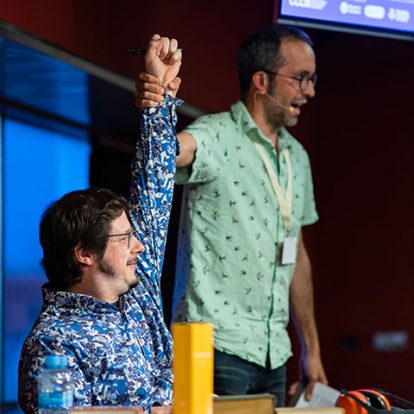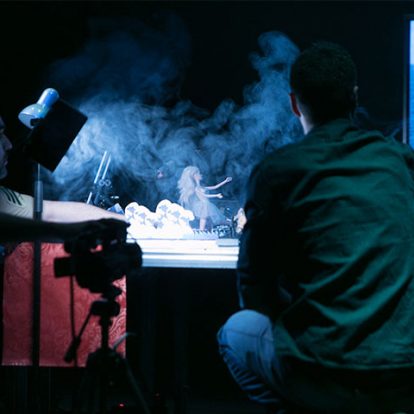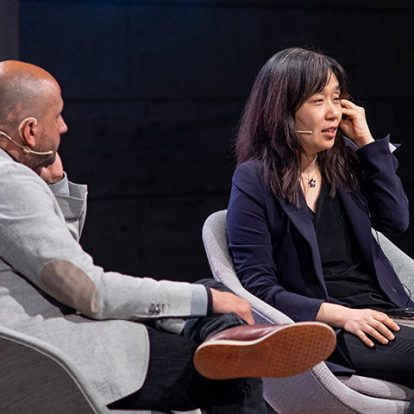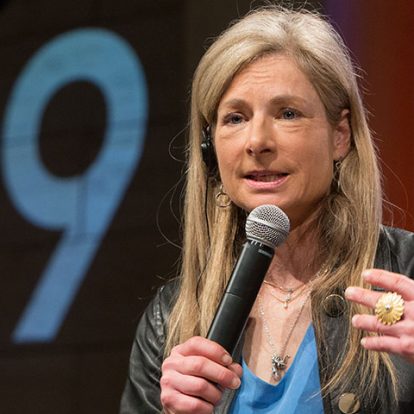The future of reading at Bookcamp Kosmopolis
Eva Rexach
23 February 2017
Is it possible to imagine a world without books? In an environment dominated by audiovisual media, what is the meaning of an object that has existed virtually unchanged for hundreds of years? Bookcamp Kosmopolis will be an opportunity to discuss the future of books and narratives.
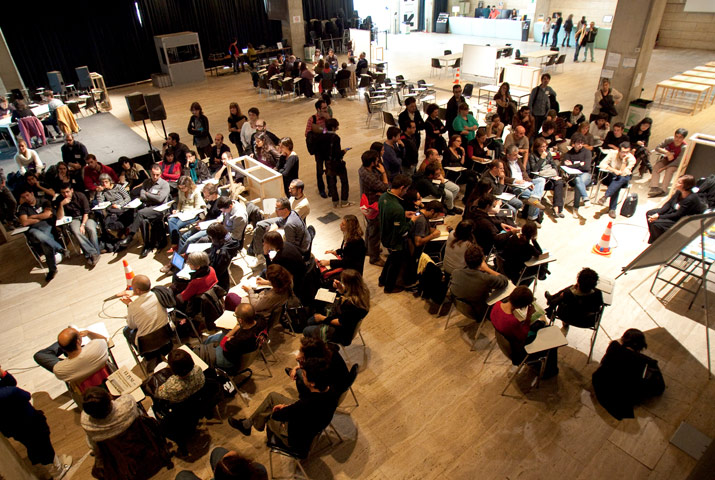
The narrative, as we understand it until now, is mutating. It changes media, genres and formats, and leads to a world in which stories are no longer lived from the couch, but from a screen. The sector is divided among small publishers, who continue relying on books with really cared editions, new authors and appealing covers and interactive projects that seek a user experience that seems futuristic but it is not so much anymore. In the middle of this, the big publishing groups keep on relying on bestsellers and renowned writers and seek new ways to encourage the readers.
Full of debates, workshops and conferences, the fourth edition of Bookcamp Kosmopolis deals with this new ecosystem from different perspectives. On the one hand, we have the narrative in virtual reality: immersive experiences in which the user is part of the story. On the other hand, there are new techniques and ways of writing. We will discuss new forms of reading too, also about audiobooks or podcasts. We will listen what young people have to say about it: what do they read and how they read. And we will dare to make predictions about the future of books and narrative.
Stories from all points of view
Narrative in virtual reality (VR) or in 360° is a reality that is about to take the big leap. Soon, having a device that allows immersive experiences will be as usual as having a phone; in fact, we already have simple devices that allow approaching to this experience. Meanwhile, the most advanced VR glasses serve as a sign of the possibilities offered by this technology. For this reason, we will have a “Laboratory of stories” at the Bookcamp, a showroom where you can try different models and live different narrative adventures divided into four themes: documentaries, independent narratives, children and social change ones.
For example, Eva Domínguez, CEO from Minushu, will talk about NewsKid, an application of virtual and augmented reality aimed for explaining the world to children. People in charge of Taller Estampa will explain their interactive projects as Las Sinsombrero or La vampira del Raval. Also the NGOs, by the hand of Lucía Andújar, from Quepo, will be present at the Bookcamp for showing the interactive documentaries in 360° in which they are working for explaining the social conflicts. And finally, the new documentary narratives have a space in this laboratory with a presentation of the special 360° My friend by TV3. This talks will be moderated by Carles Sora (professor at the UPF).
New forms of writing
Stories can be told in many ways. And these same stories may transmute into other genres and overcome the barriers of the physical book. How are produced the new digital narratives? We talk about that in a panel discussion with experts from different fields: Isabel Fernández (Documentary director and producer of the web documentary Orgull de Baix), Aritz Cirbián (Compacto.coop), Francisco Vargas Echeverría (Director of the Audiovisual area from the Catalan Institute of Cultural Industries) and Jordi Mendieta (President of the Audiovisual Group from Catalonia).
For those who dare to write their own history, the theater director Belén Santa-Olalla will lead a workshop for learning how to make scripts for digital narratives (preliminary registration required) with Nieves Rosendo and also she will explain the project “The Process” of Kafka, a transmedia experience which consisted of a play, street actions, immersive performances and audience participation. Ignacio Lirio will give another workshop dedicated to writing applications for the creation of texts: free and paid tools to spark literary creativity. And several authors explain what NaNoWriMo is (National Novel Writing Month), an online writing project that consists of writing a 175 pages novel in a month time.
New readers and new (or old) ways to read
Young readers, readers from the present and future, will have their space at the Bookcamp with two talks. On the one hand, some representatives of the Literary Europe Live program from the Literature Across Frontiers project, which is part of Kosmopolis since 2015, will propose a series of questions for discussion: How to program for young readers? How to get their attention?
In the section devoted to reading, we will discuss about new forms of reading and how to live the experience of reading. In collaboration with the Library Service of the Barcelona Provincial Council, we will begin the meeting with the Portable Reading Laboratories, an initiative to enjoy literature with the family. The podcasts and audiobooks, which have a large audience outside our borders, will also have their space at Bookcamp, with a panel discussion involving representatives of Penguin Random House, Narratores, Audioteka and Miut.
Ecoedition and female Edition
The 2017 edition of Kosmopolis is entitled “When everything changes”, and is divided into two main areas: climate change and social change involving movements such as feminism. The Bookcamp is no stranger to these two matters, and we will discuss about ecoedition and female editing. In the first case, we will count on Pol·len editions, a publishing cooperative that applies sustainability, respect for the environment and good practices to the book publishing. In the second case, we will point some ideas about the edition from the female point of view: Is woman-friendly the editorial environment? The projects led by women add value or have a different approach to the men ones? We will talk with Lauren Romeo (Tekstum Solutions), Laura Huerga (Ray Green Publishing), Martina Torrades (The Spanish Bookstage) Maribel Riaza (innovation in the books’ world) and Joana Sanchez (Incipy).
Content and surveys
The Bookcamp Kosmopolis is, in many cases, a laboratory of ideas for the future. For this reason, we dare to make a prospecting exercise and we will take a risk. Well, actually, Javier Celaya will take the risk, giving us a talk titled “The inevitable”. In a world of cars and trains without drivers, intelligent vacuum cleaners and refrigerators, the books will remain being the same? How will affect the big data to our reading experience? Will the book disappear definitely as other digital media? (Remember the Laser disc or cassette tape).
Dan Franklin will speak about the future, but above all about present, as a digital strategist in Canongate Books and Penguin Random House. His talk will focus on content and other key questions: How does Internet affect the disintermediation and self-publishing in the publishing industry? Which is the role of the curator of contents in the publishing world? Does it make sense to copyright in the new digital environment?
The Bookcamp Kosmopolis therefore will make proposals and solutions, but also leave us with some questions… and we will have to solve them in the next edition. This year will take place in various areas of the CCCB and, as always, the public will have free access. You are all invited.
More content about storytellin on lab.cccb.org

